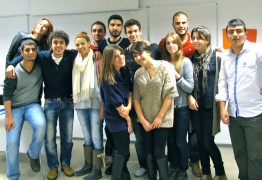This year I almost turned into an illegal immigrant.
Back in September, eager to be useful here in Istanbul, I started looking for a job. Through Sankar’s assistant I met Brian, a young American man starting a language school, and he offered me a position. I would work as a language tutor, conversing with students in English, encouraging their proficiency and practice.
When I told expatriate friends about my new job, several asked me if I would be getting a work permit. I didn’t know the answer, in fact I had never heard of this document. Since Brian had said nothing about it, it seemed I was going to be working off the books, paying no income or other Turkish taxes.
This didn’t particularly bother me. I already have a residence permit; if people are willing to pay for my English skills, why shouldn’t I work in Turkey?
It isn’t that I have a problem paying taxes here in Turkey. Sankar’s salary is taxed, and we always refuse the forms offered to us when we make a purchase, paperwork that entitles us to recover the 18 percent value-added sales tax. We do this because we have great respect for our new country. The place seems competently governed and well-organized. The roads are excellent, the streets are clean, crime is relatively low, and in a densely populated city, an amazingly peaceful life is possible.
No, it was simply that I didn’t want to attempt a bureaucratic procedure in Turkish with the risk of a negative outcome, all for a mere part-time job. Only later it struck me how easy it was for me to justify this illegality. And then I wondered about foreigners in my own country, those focused not on productive fulfillment, but on feeding and clothing their families.
As things turned out, Brian’s business did not grow as expected, and he didn’t have the need for extra tutors. In the meantime, I interviewed at several universities and received an offer to teach English at one of them. But then expatriate friends began to tell me more about work permits. They told me that foreigners can work only if they’ve been in country for five years. Several mentioned a rule that spouses of expatriates working in Turkey cannot hold jobs. What I read online backed this up. When I learned that the unemployment rate in Turkey is chronically above ten percent, these rules actually start to sound sensible.
Through my new university employer, I have completed the forms to apply for a work permit. Apparently the permit situation is not quite so dire. There is a special committee that reviews applications from universities, who depend on foreigners for a great part of their staffing. That said, my work permit is not yet in hand.



Good luck in this new phase of your adventure!
Terry Robertson